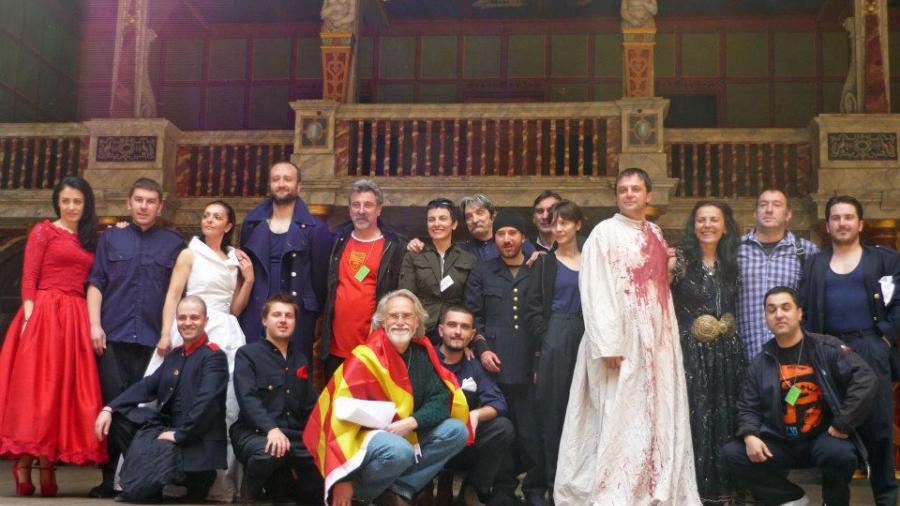Westmont Magazine All the World’s on Stage

John Blondell and the cast of “Henry VI: Part 3” at the Globe Theatre, London.
Theater professor John Blondell directed “Henry VI: Part 3” when the Globe presented all of Shakespeare’s plays, each in a different language.
For years, John Blondell has imagined directing a Shakespeare play at the Globe Theatre in London, staging it in his mind and thinking it would never happen. But his connection to the international theater community led to an unimaginable opportunity: an American professor directing a Macedonian cast performing Shakespeare in their native language.
As part of the Cultural Olympiad celebrating the 2012 Olympic Games, the Globe Theater presented an unprecedented festival: Globe to Globe: 37 Languages; 37 Plays. John directed the National Theatre of Bitola in two performances of “Henry
VI: Part 3.” Three Balkan companies, Macedonian, Serbian and Albanian, acted the three Henry VI plays, which portray civil war, unrest and dissolution. The casts infused the historical plays with their own tragic legacy of more recent unrest.
“When you direct Shakespeare in another language, you see a recognizable play that’s not recognizable,” John says.“There’s a gap in understanding between the actors and director, and they must trust each other. A cultural, traditional style emerges, and the production becomes an intercultural work.”
John coached the Macedonian actors in a rich, muscular treatment of their language, requiring them to avoid the pauses typical of Macedonia theater.“I wanted dynamic playing in the moment,” he says.
Considering the Globe his set, John brought one prop: a stool. He staged scenes in the balcony, brought actors on stage through the audience and used all elements of the stage. He sat in the gallery for the first performance and stood in the pit for the second.“These are two very different ways to see the play,” he says.“I like the sense of contact audiences get in the pit— they gain a visceral intimacy with the actors.”
The production premiered a new Macedonian translation by Dragi Mihajlovksi, and John streamlined the play to make it tighter, compact and more energetic.“I took a huge, sprawling, messy and complicated play and made it simpler and more manageable,” he says.“I focused on physical choreography and the visual elements of the play. Using a lot of Macedonian music and costumes by Blagoj Miscevski made the production distinctly Macedonian.”
The play, now part of the National Theatre of Bitola’s repertory, has gained acclaim in Macedonia, winning the top prize at a recent theater festival.
John worked on Henry VI for a year. Experience directing international casts has taught him to stage a play first in English with his Lit Moon Theatre Company in Santa Barbara. The directors of the Albanian and Serbian Henry VI productions and the director of the Globe to Globe festival attended Lit Moon’s premier in February 2012. John flew to Macedonia to work with the cast during spring break and returned there in May. The company arrived in London May 10, had four hours May 12 to rehearse at the Globe, and performed that evening and the next day.
John first encountered the international theater community at the Edinburgh Fringe Festival in 1996, and he started making connections. He invited troupes from eastern Europe to perform in Santa Barbara and spent a 2007 sabbatical there presenting two Lit Moon productions at festivals in Poland, Montenegro and Macedonia. He organized the Lit Moon World Shakespeare Festival in 2006 with seven companies from five countries, the first such event in the nation. Lit Moon held a smaller Shakespeare festival in 2008, and the company continues to collaborate on international productions.
In 2009, John met Dominic Dromgoole, the Globe’s artistic director who conceived the idea of the Globe to Globe festival.The Globe brought “Love’s Labor Lost” to Santa Barbara, and John invited Dromgoole and several actors to dinner at his home with theater students. In 2010, Dromgoole asked John to recommend directors for Globe to Globe, and John suggested the Albanian, Georgian and Chinese directors who participated in the festival.“It was hard watching my friends get invited to direct plays,” he says. But his turn came; Dromgoole asked John to work with the National Theatre of Bitola. Quickly reading all three plays, early works rarely performed, John chose the third one, which seemed most difficult, challenging and interesting.
Directing a play at the Globe surpassed even John’s imagination. “It was an unexpected, peak experience,” he says.